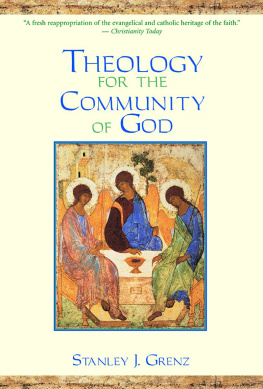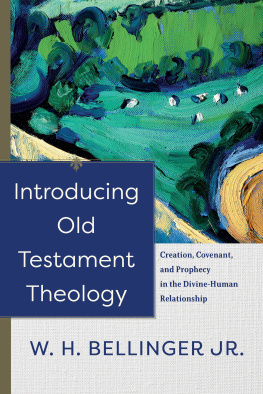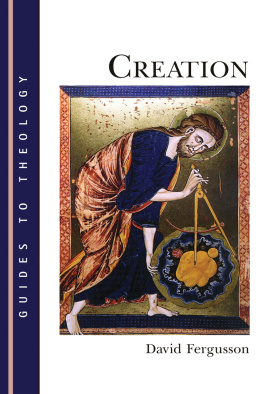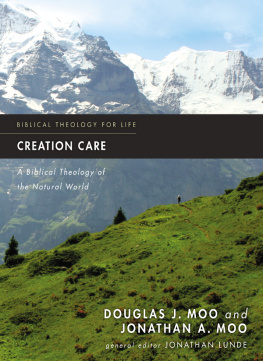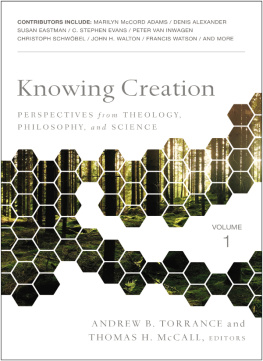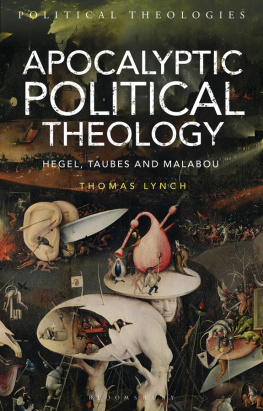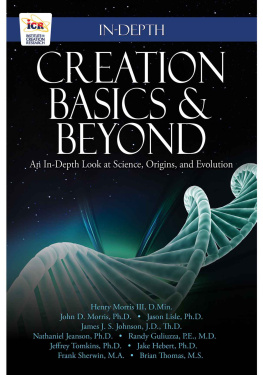CREATION THEOLOGY
Jose Morales

Contents
Chapter 1
An Introduction To The Theology Of Creation
Creation in the general context of Christian dogmatic theology
Modern dismissal of creation
Updating creation studies
Creation as a horizon for Christian theology and life
Creation in historical theology
The teaching on creation and its connexion with other Christian mysteries
Outline of this textbook
part one: creation in general
Chapter 2
Creation In The Old Testament
The creation account in Genesis 1: 1-2:4a
Features
Structure and division
Commentary
Genesis 2:5-25
Creation in the prophetical books
The Psalms
Wisdom literature
The Second Book of Maccabees
The theological and religious meaning of Old Testament teaching on creation
Chapter 3
Creation In The New Testament
General
The Synoptic Gospels
Acts of the Apostles
St Paul
Epistle to the Hebrews
St John
Conclusion
Chapter 4
The History Of The Christian Dogma Of Creation (I)
The notion of creation in Greek thought
Philo of Alexandria
The Apostolic Fathers and the Christian Apologists
Fourth- and fifth-century theology
The writings of Dionysius
The beginning of the Middle Ages
Scholasticism. St Thomas Aquinas
A mystical interpretation of creation
The Nominalists
Martin Luther
Chapter 5
The History Of The Christian Dogma Of Creation (II )
The beginnings of modern thought
European rationalism
Creation and subjective conscience
The impact of idealism
Renewal of creation theology in Catholic circles in the 19th century
Modern Protestant theology
Development of Catholic theology on creation in the 20th century
Chapter 6
Creation In The Creeds And The Magisterium Of The Church
The faith of the early Church and the liturgy
The creeds
The First Council of Nicaea
The Councils of Constantinople
The Fourth Lateran Council
The Council of Cologne
The First Vatican Council
The Second Vatican Council
Postconciliar Magisterium
Chapter
The Notion Of Creation
The act of creating
The cr e at e d status of the world and of man
Creation and evolution
Creation, the work of all the Trinity
Creation and redemption
Chapter 8
The Divine Act Of Creation. Its Properties And Consequences
Creation, a free act of God
The world was made by God out of nothing ( ex nihilo )
The world was created within time
Chapter 9
The Purpose Of Creation
Created things exist for the glory of God
The glory of God and man's happiness
Chapter 10
Science And The Doctrine Of Creation
Theology and science
Dialogue between science and faith
Theology and science on the subject of creation
Two extreme hypotheses: absolute evolutionism and scientific
creationism
The origin of the universe
The anthropic principle
part two: creation as the start of salvation history
Chapter 11
The Angels
Invisible created beings
Angels in the Old Testament
Angels in the New Testament
Christian tradition
Angels in the liturgy
The teaching of the Church concerning angels
Functions of the angels
Veneration of angels
Chapter 12
The Creation Of Man And Woman
The two biblical accounts
The Priestly account
Made in the image of God
Man and woman
The Yahwist account
The creation of woman
Mankind is something special
Man and woman: equality and differences
The human being as God's image
Chapter 13
The Origin And Nature Of Man. His Openness To Grace
Theological anthropology
Modern anthropological ideas
The origin of man
The somatic and spiritual nature of man
The human soul
The origin of the soul
Essential features of the human being
The oneness of the human race
Man's elevation to the order of grace
Chapter 14
Original Sin
The fall of man
The Old Testament
The New Testament
St Augustine and the Pelagian controversy
The Councils of Carthage (418) and Orange (526)
Luther and the Council of Trent (1545-1563)
The Second Vatican Council and the Profession of
Faith of Paul VI (1968)
The effects of original sin
Chapter 15
The Problem Of Evil
Introduction
Physical evil and moral evil
The origin of evil
Evil and suffering in Holy Scripture
Jesus and suffering
The metaphysics of evil
The existence of God and the meaning of evil
An integrated view of the mystery of suffering and love
Chapter 16
Providence
God, a Creator who cares for his creation
The testimony of Holy Scripture
The philosophical notion of God's governance of the world
Providence and human life
Providence at work
Chapter 17
Man's Vocation In The Created World
Man, a being called by God
Vocation and man's task in the world
The theology of earthly realities
The autonomy of the temporal order
Work and its meaning in human life as cooperation in God's plans
Chapter 18
Man's Dominion Of Nature
Introduction
Factors causing an ecological crisis
Ecological awareness in the context of creation theology
Presumed and true causes of the crisis
Proposed solutions and remedies 6 Towards a theology of the earth
chapter 1
An Introduction to the Theology of Creation
creation in the general context of christian dogmatic theology
Creation theology is a part of Christian dogmatic theology that deals with the origin of the world and of man. This theme, along with that of God, is basic to the Christian notion of the value of created things and human life: 'I believe in one God, the Father Almighty, creator of heaven and earth.' The first article of the Creed expressly reminds all believers that Christianitythe religion of redemption par excellenceis also a religion of creation.
It therefore views the redemption of mankind by Christ in the context of a comprehensive divine activity which gives rise to every being and, over the course of time and history, leads all beings providentially and solicitously to their end, that is, to their ultimate perfection and destiny.
The creation of the world and man by God is a mystery of faith. It is not just an empirical deduction which can neatly fit the findings of scientific research into the origin of the universe. 'By faith we understand that the world was created by the word of God, so that what is seen was made out of things which do not appear' (Heb 11:3).
The human mind, on its own, cannot take in the fact of creation, or investigate adequately, unless it is helped to do so by faith. That does not mean that reason is unable to come to terms with the mystery of the ultimate origin of the world or that it cannot in any way grasp what that involves. It simply means that only men and women who are believers are in a position to grasp unambiguously the fact of creation in all its depth and with all that flows from it.
When Holy Scripture speaks about the creation of the world and man, and when the Church and Christians acknowledge it in the Creed, they are not simply slating a cosmological truth: they are making a confession of faith. In that confession we say that there is only one God, the sovereign cause of the world, whose impulse is love. Divine Power and Love lie at the very basis of creation. To create means to make a good thingto cause a good thing to exist. To acknowledge creation is a way of praising God.

